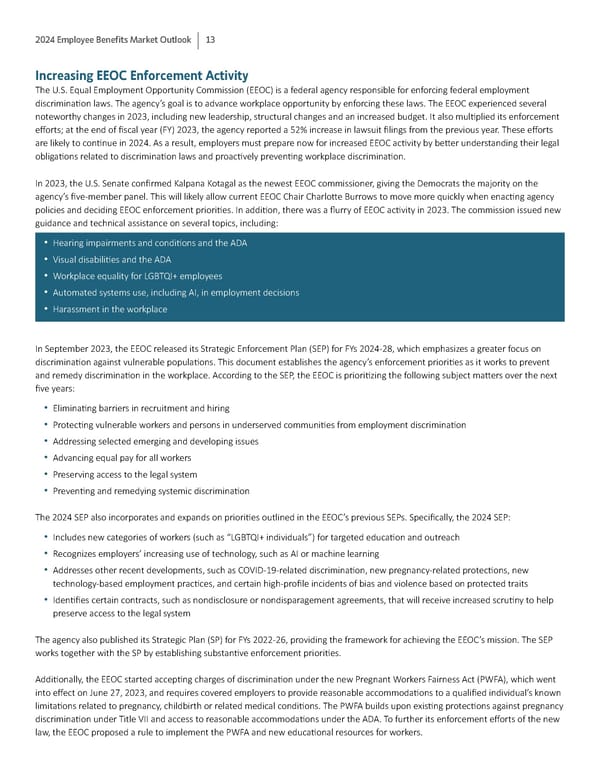2024 Employee Benefits Market Outlook 13 Increasing EEOC Enforcement Activity The U.S. Equal Employment Opportunity Commission (EEOC) is a federal agency responsible for enforcing federal employment discrimina琀椀on laws. The agency’s goal is to advance workplace opportunity by enforcing these laws. The EEOC experienced several noteworthy changes in 2023, including new leadership, structural changes and an increased budget. It also mul琀椀plied its enforcement e昀昀orts; at the end of 昀椀scal year (FY) 2023, the agency reported a 52% increase in lawsuit 昀椀lings from the previous year. These e昀昀orts are likely to con琀椀nue in 2024. As a result, employers must prepare now for increased EEOC ac琀椀vity by be琀琀er understanding their legal obliga琀椀ons related to discrimina琀椀on laws and proac琀椀vely preven琀椀ng workplace discrimina琀椀on. In 2023, the U.S. Senate con昀椀rmed Kalpana Kotagal as the newest EEOC commissioner, giving the Democrats the majority on the agency’s 昀椀ve-member panel. This will likely allow current EEOC Chair Charlo琀琀e Burrows to move more quickly when enac琀椀ng agency policies and deciding EEOC enforcement priori琀椀es. In addi琀椀on, there was a 昀氀urry of EEOC ac琀椀vity in 2023. The commission issued new guidance and technical assistance on several topics, including: • Hearing impairments and condi琀椀ons and the ADA • Visual disabili琀椀es and the ADA • Workplace equality for LGBTQI+ employees • Automated systems use, including AI, in employment decisions • Harassment in the workplace In September 2023, the EEOC released its Strategic Enforcement Plan (SEP) for FYs 2024-28, which emphasizes a greater focus on discrimina琀椀on against vulnerable popula琀椀ons. This document establishes the agency’s enforcement priori琀椀es as it works to prevent and remedy discrimina琀椀on in the workplace. According to the SEP, the EEOC is priori琀椀zing the following subject ma琀琀ers over the next 昀椀ve years: • Elimina琀椀ng barriers in recruitment and hiring • Protec琀椀ng vulnerable workers and persons in underserved communi琀椀es from employment discrimina琀椀on • Addressing selected emerging and developing issues • Advancing equal pay for all workers • Preserving access to the legal system • Preven琀椀ng and remedying systemic discrimina琀椀on The 2024 SEP also incorporates and expands on priori琀椀es outlined in the EEOC’s previous SEPs. Speci昀椀cally, the 2024 SEP: • Includes new categories of workers (such as “LGBTQI+ individuals”) for targeted educa琀椀on and outreach • Recognizes employers’ increasing use of technology, such as AI or machine learning • Addresses other recent developments, such as COVID-19-related discrimina琀椀on, new pregnancy-related protec琀椀ons, new technology-based employment prac琀椀ces, and certain high-pro昀椀le incidents of bias and violence based on protected traits • Iden琀椀昀椀es certain contracts, such as nondisclosure or nondisparagement agreements, that will receive increased scru琀椀ny to help preserve access to the legal system The agency also published its Strategic Plan (SP) for FYs 2022-26, providing the framework for achieving the EEOC’s mission. The SEP works together with the SP by establishing substan琀椀ve enforcement priori琀椀es. Addi琀椀onally, the EEOC started accep琀椀ng charges of discrimina琀椀on under the new Pregnant Workers Fairness Act (PWFA), which went into e昀昀ect on June 27, 2023, and requires covered employers to provide reasonable accommoda琀椀ons to a quali昀椀ed individual’s known limita琀椀ons related to pregnancy, childbirth or related medical condi琀椀ons. The PWFA builds upon exis琀椀ng protec琀椀ons against pregnancy discrimina琀椀on under Title VII and access to reasonable accommoda琀椀ons under the ADA. To further its enforcement e昀昀orts of the new law, the EEOC proposed a rule to implement the PWFA and new educa琀椀onal resources for workers.
 2024 Employee Benefits Market Outlook Page 12 Page 14
2024 Employee Benefits Market Outlook Page 12 Page 14